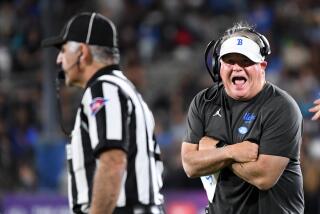NHL’s union has a new man with a plan
- Share via
Paul Kelly has prosecuted the shameless (embezzler Alan Eagleson, former head of the NHL players’ union) and defended the indefensible (Marty McSorley’s club to the head of Donald Brashear in 2000), so it’s not as if the man shies away from confrontation.
It’s by design that Kelly, who left a lucrative Boston law practice to become executive director of the NHL Players’ Assn. three months ago, is taking a calm approach in leading the union past a turbulent era and toward a future that might include an economic downturn.
Kelly is the third man to hold the job in less than 2 1/2 years. Bob Goodenow, so antagonistic during the lockout that wiped out the 2004-05 season, resigned in July 2005 after being forced to accept a salary cap. His successor, Ted Saskin, was fired last May amid allegations he had spied on players’ e-mails.
Kelly, a former U.S. attorney, trial lawyer and youth hockey coach, will resume meeting with teams next week, after Sunday’s All-Star game in Atlanta. He expects to know by August if players favor reopening the collective bargaining agreement, which they can do by giving the NHL notice 120 days before Sept. 15, 2009.
Another labor dispute would be disastrous for the NHL, which lost its ESPN deal because of the previous discord.
“We’re also mindful that reopening is not a one-sided enterprise,” Kelly said. “Once we reopen, we reopen both sides of the equation and we give the opportunity to management to push back and raise issues that they want to raise.”
Players want to scrap the escrow system, but it’s not worth junking the deal for that. Kelly won’t be militant for militancy’s sake or to play power games.
His style seems effective, and he has gotten players a seat at the table in discussions of disciplinary matters. Kelly wants that inclusion to grow.
“We want to have a voice in everything,” he said. “I said that to the owners, ‘If being a partner in this enterprise means what you claim, it means we really should be consulted about every issue.’
“And I don’t mean after the fact, I mean at the time you’re considering such issues, whether to relocate, whether to expand. Whether to change the schedule. Make us a presentation. Give us an opportunity to discuss it and give legitimate feedback.”
Kelly sees areas where changes could benefit both sides.
He suggested staging more outdoor games and playing on Christmas Day and said players would agree to extend the season to 84 games if the exhibition schedule were cut. More games in Europe, continuing the NHL’s participation in the Olympics -- which owners may fight -- and reviving the World Cup tournament are other ideas he’d promote to gain exposure and revenues.
And in a welcome example of sanity, he said the union doesn’t favor expanding beyond 30 teams or expanding the playoffs beyond 16 teams. His resolve might be tested by owners who salivate over potential expansion fees from Kansas City and Las Vegas, but it’s a cause any true fan supports.
“I think our league is properly configured at the present time,” he said. “I think our focus should be on trying to help those franchises that aren’t doing as well as perhaps they could do.”
Kelly also brings a realistic and insistent voice to one of the NHL’s biggest problems: its lamentable TV deal with Versus.
Unlike the suits at NHL headquarters, Kelly knows the NHL needs the cachet and exposure of ESPN. A return is not impossible. Although the NHL last week sentenced itself to three more years on Versus, it could ask the network to waive its exclusive U.S. cable rights and then negotiate with ESPN.
Versus reaches 74 million homes but not many restaurants, bars and hotels. “And that’s a big loss. And we’re hearing it,” Kelly said. “I’ve seen it myself when I go out on the road. . . .
“They are working on those issues. I also think that Versus recognizes the need to do more in terms of promotion and advertising, promoting on other networks. Not just slapping up a poster here and there at a rink to advertise Versus, but to actually try to have much more of a plan in terms of making the American public aware of this network and the programming that they offer.”
Additional TV revenues generated by ESPN telecasts could offset the bumps of a wobbly U.S. economy. NHL revenues exceeded $2.3 billion last season, boosted by the resurgent Canadian dollar, but there’s no guarantee the loonie will stay strong -- or that revenues south of the border will continue to grow.
“Am I concerned that a recession in the United States could impact the revenues? Absolutely,” Kelly said.
“If a recession means that families have to cut down on spending of disposable income on entertainment, then I think all forms of entertainment, including sports and restaurants and theater, will take a hit. So we will take a hit there.”
In the meantime, Kelly is urging players to get more involved in marketing the game and making sure the world knows what hockey fans have always known: that players are the NHL’s best asset. Those players deserve a smart leader who knows when to fight and when to deal. They may have found one in Kelly.
--
Helene Elliott can be reached at [email protected].
To read previous columns by Elliott, go to latimes.com/elliott.
--
NHL ALL-STAR GAME
* When: Sunday, 3 p.m. PST
* Site, TV: Atlanta, Versus
More to Read
Go beyond the scoreboard
Get the latest on L.A.'s teams in the daily Sports Report newsletter.
You may occasionally receive promotional content from the Los Angeles Times.







